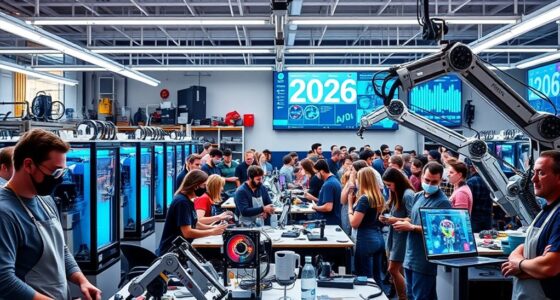To use AI tools for self-improvement, start by exploring platforms that offer personalized growth plans, like My Life Quest, which analyze your habits and strengths. Engage with AI-driven coaching for skill development, stress management, and mental well-being. Automate repetitive tasks to boost productivity and seek transparent AI solutions to build trust. Embracing responsible AI use guarantees safe, effective progress. Keep going to discover more ways AI can transform your journey to a better you.
Key Takeaways
- Leverage AI platforms like My Life Quest for hyper-personalized growth plans tailored to your strengths and weaknesses.
- Use AI-driven learning tools such as Dextego to accelerate skill acquisition and receive real-time coaching.
- Monitor your mental health with AI that detects mood shifts, offering personalized mindfulness and early support.
- Automate repetitive tasks and optimize workflows with AI to enhance productivity and prevent burnout.
- Ensure ethical AI use by prioritizing transparency, explainability, and responsible management for trustworthy self-improvement.

In 2024, AI tools have become essential allies for self-improvement, transforming how you set goals, develop skills, and boost productivity. With 78% of organizations adopting AI—up from 55% last year—it’s clear that AI is now a core component of personal growth. These tools help you analyze your habits, strengths, and weaknesses in real time, allowing you to craft hyper-personalized growth paths. Platforms like My Life Quest harness machine learning to adapt based on your goals and aspirations, providing tailored strategies instead of generic advice. This means you can learn up to twice as fast compared to traditional methods, thanks to AI’s ability to deliver immediate, adaptive feedback on your progress, habits, and motivational needs. It also detects mood shifts and stress signals, offering personalized mindfulness prompts and early mental health support, making your self-improvement journey more responsive and balanced.
AI tools in 2024 personalize your growth, boosting learning speed and mental well-being through real-time feedback and adaptive strategies.
AI is revolutionizing skill development too. Virtual role-playing platforms and AI-driven coaching, like Dextego, enable you to practice communication, emotional intelligence, and problem-solving at your own pace, with 24/7 feedback. AI accelerates onboarding and training by automating role-playing exercises and providing instant insights, helping you close skill gaps faster. In technical fields, language models now outperform humans in some programming tasks within limited timeframes, emphasizing AI’s role in sharpening your technical abilities. Beyond hard skills, AI helps you develop soft skills such as leadership and teamwork through interactive scenarios, making learning more engaging and effective. Major scientific awards have increasingly recognized AI’s impact across disciplines, underscoring its importance in scientific progress. Additionally, integrating sound design principles into AI-driven training modules can enhance user engagement and retention, making learning experiences more immersive.
When it comes to productivity and efficiency, AI can triple your task completion speed by automating repetitive tasks and filling skill gaps across your workflow. However, integrating AI wisely is vital to prevent burnout; start small, test one tool at a time, and regularly review your progress. Freelancers benefit from AI by honing specialized skills without sacrificing work-life balance, emphasizing a human-centric approach to AI adoption.
While AI offers tremendous potential, ethical considerations remain essential. Transparency and explainability—understanding how AI makes recommendations—build trust and ensure responsible use. As AI continues to evolve in self-improvement, your ability to leverage these tools wisely will determine your success in steering the cosmic landscape of personal growth.
Frequently Asked Questions
How Can AI Help Identify My Personal Strengths and Weaknesses?
AI can help you identify your strengths and weaknesses by analyzing your behavior, communication styles, and emotional responses through data from videos, speech, and social media. It detects patterns over time, showing where you excel or need growth. By providing personalized feedback, AI guides you in developing skills and roles that match your traits, ultimately boosting your self-awareness and helping you make informed decisions for self-improvement.
Are AI Tools Effective for Long-Term Self-Improvement Goals?
AI tools can support your long-term self-improvement, but their effectiveness depends on how you use them. They excel at providing personalized feedback and fostering self-regulated learning, helping you track progress over time. However, overreliance might weaken your neural engagement and intrinsic motivation. To maximize benefits, combine AI with traditional methods, stay mindful of dependency, and regularly assess your growth, ensuring sustained development.
Can AI Assist With Emotional Intelligence Development?
Yes, AI can help you develop emotional intelligence by tracking your emotional patterns and offering personalized insights. It uses emotion recognition to adapt its responses, helping you understand and regulate your feelings better. You can engage with AI-driven simulations and role-plays to improve empathy, negotiation, and conflict resolution skills. While AI can’t feel emotions, it provides valuable feedback and support, boosting your emotional awareness and self-regulation.
What Are the Privacy Considerations When Using AI for Self-Improvement?
Privacy when using AI for self-improvement is like walking a tightrope—you need balance. You should be aware that your conversations, thoughts, and even uploaded files might be collected, stored, and used for training without clear consent. Always check privacy policies, opt out if possible, and be cautious about sharing sensitive info. Protecting your data guarantees your self-growth journey remains personal, not another open book for others to read.
How Do I Choose the Best AI Tool for My Specific Needs?
To choose the best AI tool for your needs, first define your goals clearly. Research options that align with those goals, focusing on features like personalization, real-time coaching, and ease of use. Read user reviews and check for evidence of effectiveness. Confirm the tool prioritizes data privacy. Start with one tool, use it consistently, and monitor your progress, adjusting as needed to find the perfect fit for your self-improvement journey.
Conclusion
Just like a star guides sailors through the night, AI tools can steer your self-improvement journey. Imagine Sarah, who used meditation apps powered by AI to find calm amid chaos, transforming her life. Studies show that consistent self-guidance accelerates growth by 40%. Embrace these tools as your cosmic compass—your personal navigation system in the vast universe of self-development. With AI as your guide, you’re destined to reach new heights beyond what you thought possible.











